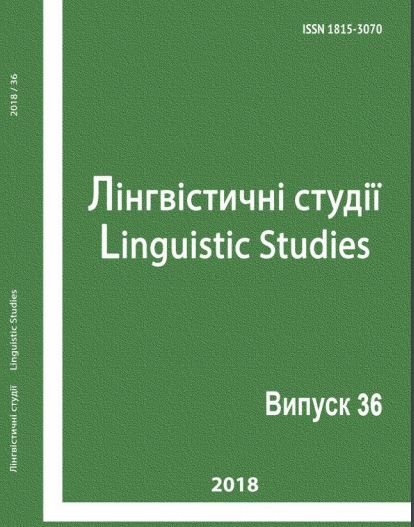Some issues in research of eponymous business name motivation (with reference to ukrainian onomasticon).
DOI:
https://doi.org/10.31558/1815-3070.2018.36.16Keywords:
onomastics, business name (ergonyms), eponymy, motivation, inner form, semantics, pragmatics, arbitrarinessAbstract
In investigating the motivation of eponymous business names, in order to encompass the whole range of their traditional and present-day varieties, it is advisable to use an approach that is both linguistic and linguosemiotic, Within its framework, ergonyms will be analyzed from the viewpoint of the typology of semantic shifts as well as that of semiotic representation. An integrated approach of this kind, while taking into consideration clear-cut as well as borderline and heterogeneous cases, will be able to give them all a unified systemic interpretation. Establishing semantic and pragmatic factors relevant for ergonym inner form structuring, and elucidating them from both the sociocultural and language-internal perspective, this scheme of analysis will find out how different aspects and types of eponym motivation, rather than remain isolated, interact, combine and overlap in individual ergonyms determining their specificityReferences
Akul’shyna Natalia. Suchasna vijs’kova terminoligiya: kgnityvno-pragmatychni vymiry (na materiali pers’koyi, ukrayins’koyi ta angliys’koyi mow (Modern military terminology: cognitive-pragmatic parameters (with reference to Iranian, Ukranian and English). Diss. Kyiv National Taras Shevchenko University, 2016. Print.
Aristotel’. “Poetika. Book III (Aristoteles. Poetics. Book III)”.Aristotel’ i antichnaya literatura (Aristoteles and Antique Literature). Moscow: Nauka, 1988. 107-299. Print.
Beley, Oleh. Suchasna ukrayins'ka erhonimiya: vlasni nazvy pidpryyemstv Zakarpattya (Modern Ukrianian Ergomys: Proper Names of Businesses of Transkarpathian Region). Uzhhorod, 1999. Print.
Booij, Geert. “Phrasal names: a constructionist analysis”. Word structure 2 (2009): 219-149. Print.
Ingarden Roman. O dziele literackim. Badania z pogranicza ontologii, teorii języka i filozofii literatury (On a work of literature. Studies on the borderline of ontology, language theory and filozofy of literature). Warsaw: PWN, 1988. Print.
Karpenko Yuriy . “Sovremennoye razvitiye russkoy onomasticheskoy sistemy (Modern Development of Russian Onomastic System)”. Aktualnyye voprosy russkoy onomastiki (Current problems of Russian onomastics). Kyiv: UMK VO, 1988, 5-14. Print.
Kutuza, Nataliya “Strukturno-semantychni modeli erhonimiv (na materiali erhonomikonu m. Odesy) (Structural and Semantics Models of Ergonyms (Based on Ergonyms of Odessa)”. Diss. Odesa National U, 2003. Abstract. Print.
Lyesovets', Nelia. „Erhonimiya m. Luhans'ka: strukturno-semantychnyy i sotsial'no-funktsional'nyy aspekty (Ergonyms of Luhansk City – Structural, Semantical and Social Functional Aspects”. Diss. Luhansk National U., 2007. Abstract. Print.
Otin Yevgeniy. „Iz istorii russkoy ergonimii (From the History of Russian Ergonyms”). Izbrannyye trudy po yazykoznaniyu (Selected Works in Linguistics). Donetsk: 1999. 155-166. Print.
Otin, Yevgeniy. Slovar konnotativnykh sobstvennykh imen (Dictionary of Connotative Proper Names)”. Donetsk: OOO «Yugo-Vostok. Ltd». 2004. Print.
Petrashyk, Yurii. „Erhonimiya Ternopil'shchyny kintsya XX– pochatku XXI st. (Ergonyms of Ternopil Region of the late 20th and the early 21st century)”. Diss Chernivtsi National U., 2013. Abstract. Print.
Podolskaya, Natalia. Slovar’ russkoy onomasticheskoy terminologii (Doctionary of Russian Onomastic Terminology). Moscow: Nauka, 1988. Print.
Shestakova, Svitlana “Leksyko-semantychni innovatsiyi v systemi ukrayins'koyi nominatsiyi (na materiali erhonimiv i prahmonimiv) (Lexical and Semantical Innovations in the System of Ukrainian Nomination (Based on Business and Products Names)“. Diss. Kharkiv National U, 2002.Abstract. Print.
Soboleva, Tatiana, and Aleksandra Superanskaya. Tovarnye znaki (Trade Marks). Moscow: Nauka, 1986. Print.
Soshko, Oksana. Frazeologichna reprezentatsiya vnutrishnikh ryc ludyny: osoblyvosti semantyky i vnutrishnioyi formy (Fraseological representation of human inner qualities: peculiarities of semantics and inner form). Diss. Kyiv National Taras Shevchenko Univ. 2014. Print.
Sydorenko, Olena. “Nominatsiyni protsesy v polilinhval'niy erhonimiyi Donechchyny (Nomination Processes in Multilingual Ergonym System of Donetsk Region” . Diss. Donetsk National U, 2013. Abstract. Print.
Taranenko Oleksandr. “Antonomaziya (Antonomasia).” Ukrayins’ka mova. Entsyklopediya (The Ukrainian Language. An Encyclopedia). Kyiv: Ukrayins’ka Entsyklopedia, 2009. 20.
Tsilyna, Maryna . “Erhonimy m. Kyyeva: struktura, semantyka, funktsionuvannya) (Ergonyms of Kyiv city: structure, semantics, functioning)” Diss. Kyiv National Drahomanov U,, 2006. Abstract. Print.
Yermolenko Serhiy. Movne modeliuvannia diysnosti I znakova struktura movnych odynyts’ (Linguistic modelling of reality and semiotic structure of language items). Kyiv, Vydavnychyi Dim Dmytra Buraho. 2006. Print.
Yermolenko Serhiy, “Linguistic description of eponymy: parameters and problems”. Movoznavstvo (Linguistics) 4 (2018): 10-26. Print.
Yermolenko, Serhiy. “Ukrayins’ka eponimiya v sotsiokul’turnomu aspekti (Ukrainian eponymy: a socio-cultural aspect” II Mizhnardna Naukova Konferentsiya “Sotsiolingvistychne Znannia Yak Zasib Formuvannia Novoyi Kul’tury Bezpeky: Ukrayina i Svit”, 22-23 lystopada 2018.Lviv (Second International Scientific Conference” Sociolinguistic Knowledge as a Means of Formation of New Culture of Security: Ukraine and the World”, November 22-23, Lviv). Ed. by Halyna Matsiuk. Lviv: LNU, CISP, 2018. 45-47. Print.
Zymovets’ H. “Vidobrazhennia ideolohichnykh spriamuvan’ i dominantnykh identychnostey u klasi erhonimiv (Reflexion of ideological orientations and dominant identities in the class of bysiness names)”. II Mizhnardna Naukova Konferentsiya “Sotsiolingvistychne Znannia Yak Zasib Formuvannia Novoyi Kul’tury Bezpeky: Ukrayina i Svit”, 22-23 lystopada 2018.Lviv (Second International Scientific Conference” Sociolinguistic Knowledge as a Means of Formation of New Culture of Security: Ukraine and the World”, November 22-23, Lviv). Ed. by Halyna Matsiuk. Lviv: LNU, CISP, 2018. 47-48. Print.
Zymovets’, Halyna. “Zasady movnoyi polityky v haluzi neymingu (Principles of language policy in naming). Mova i suspil’stvo (Language and Society) 4 (2013): 152-157. Print.


